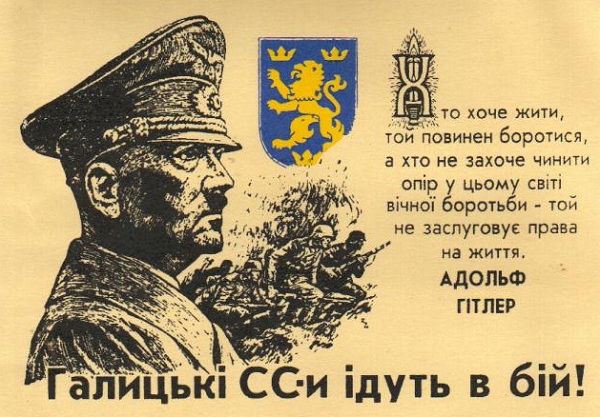Historian Vasyl Rasevych: Why is Ukraine’s politics of memory in competition with the Jewish and Polish ones?
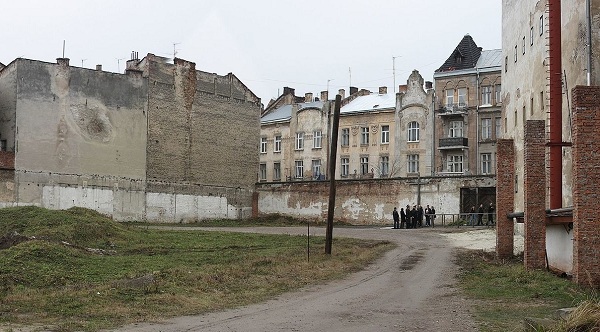
One’s shirt is always closer to the body and one’s personal misery is closer than a neighbor’s tragedy—that’s how the world works. But does this not deform the fundamentals of historical scholarship, especially in Ukraine?
A huge part of Ukraine’s politics of memory has a competitive character in relation to the Jewish one. It is a struggle for the right to be an exclusive victim. Our UINP [Ukrainian Institute of National Remembrance] is modeled on the Polish Institute of National Remembrance, and the latter, in its turn, was in many ways modeled on Yad Vashem.
Three peoples are vying for this status; thus, the UINP created the strongholds of Ukrainian victimhood. The main one is the Holodomor. This is a central event in the historical politics of memory. The number of Holodomor victims was huge, but still smaller than the number of Jews who were killed by the Nazis. Therefore, it is necessary to “surpass the Holocaust” by bringing Ukrainian losses at least to the six-million mark. Various researchers talk about three to four million people who starved to death, but the official figure of ten million has been transmitted to Ukrainian embassies abroad. This is an obvious absurdity, even if you include unborn children.
Is one of the manifestations of this exclusivity the concept behind the Lviv-based Lonsky Prison National Memorial Museum that honors the memory of the hundreds of prisoners who were shot by the NKVD in June 1941, but which does not even mention the subsequent Jewish pogrom that claimed 4,000 lives?
Yes, unfortunately. After the bodies of executed prisoners were brought into the courtyard for identification on 30 June 1941, the people who had dragged them out—local Jews—began to be killed; they were specially rounded up for this work on the Germans’ orders, with assistance from the OUN [Organization of Ukrainian Nationalists] militia. They were killed in the same prison courtyard. A surviving photograph shows how one mountain of bodies stands out: These are people dressed in decent clothing, who had just come from home. Later a pogrom began, organized by the Germans, but carried out by various people, including Ukrainians.
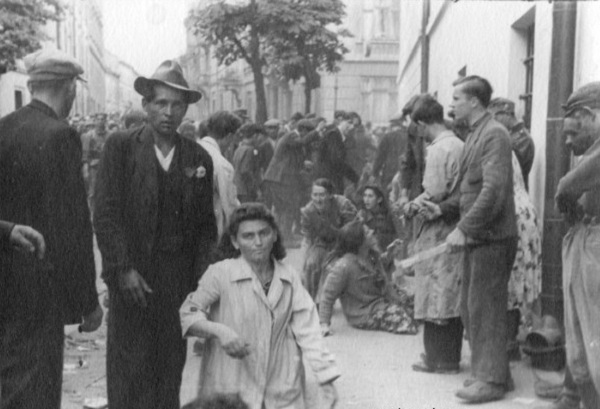
But there is not a word about this in the exposition; nor about the fact that both Poles and Jews were among the prisoners executed by the NKVD. Lists of prisoners’ names hang on the museum walls, but only the sufferings of Ukrainian nationalists are highlighted. Of course, they were there, but such a museum cannot be a museum that commemorates the sufferings of a single people.
As regards the pogrom, the director of the museum, which has been in operation for more than ten years, says that the museum associates lacked the time to describe the events of the Holocaust, apparently, even one event directly connected to Lonsky Prison. A couple of years ago the American journalist Sarah Topol heard from the director that things are not entirely clear about this pogrom and that some Jews had supposedly taken part in it. This says a lot about both the moral qualities of this man and his professional competence.
And another thing: If we are talking about a museum of occupying regimes—and this is precisely how it positions itself—then why not recount that in 1939 the NKVD carried out the first wave of arrests, mainly of wealthy Poles and Jews? Later there was a second wave, among whose victims were also Jews and Poles. It was only the third wave of arrests that affected mainly Ukrainian nationalists. All this is the history of Lviv, and that’s how it should be reflected.
Apparently, Lonsky Prison became a symbol of the NKVD’s barbarity in relation to Ukrainian freedom fighters, and symbols should be simple and clear.
The trouble is that Ukrainian researchers have limited themselves to little brochures written in the diaspora, which are based on the clichés of Nazi propaganda. However, the well-known German historian Kai Struve proved long ago that Lonsky Prison was by no means the main site of prisoner executions. That doleful honor goes to Brygidky Prison.

Until recently it was thought that such horrors had taken place in three prisons in Lviv and in the prison in Zolochiv. In fact, Lviv had four prisons, where the Chekists shot all the prisoners before the Red Army’s retreat, but the Germans were not aware of one of them, and therefore did not use it in their propaganda. When this fourth prison was finally located and the bodies of more than two hundred people were discovered there, this no longer served any propagandistic purpose, and the bodies were taken away and buried in Lychakiv Cemetery. And the prison was forgotten.
It was also forgotten in diaspora publications, compiled in full correspondence with German documents. But it is astonishing that the people who are engaged in commemorating the victims of Soviet repressions in Ukraine today also do not mention this prison; those people do not interest them either! Such is the strange aberration of the politics of memory.
One way or another, OUN members and UPA soldiers, who fought for their country’s independence, are perceived as heroes by many people, which is perfectly understandable. But how can one explain the persistence of “state historians” in whitewashing people who served the Nazis faithfully? I am talking about the soldiers of the SS Galicia Division, who wore the uniform of the country that had killed so many million Ukrainians, who were officially regarded as Untermenschen.
Not everyone was considered an Untermensch, and I would call this contemporary Ukraine’s belated revenge of the Nazi regime. The point is that the Ukrainian population of Galicia District was, in an informal sense, equated practically with Volksdeutsche. Alfred Rosenberg, the head of the Reich Ministry for the Occupied Eastern Territories, believed that after 150 years of Habsburg rule, the Ukrainians of Galicia were, in terms of civilization, significantly ahead of their countrymen from the eastern oblasts. Even in Reichskommissariat Ukraine the treatment of the local population was completely different, and special permission was required to travel from Rivne to Lviv. It is to the Ukrainian nationalists’ credit that at the National Assembly back in 1941 they opposed this artificial division.
Nevertheless, the policy of “divide and rule” proved highly effective. For example, in Galicia District Ukrainians were allowed to enter universities, they could even continue their studies in Vienna; Ukrainian theater flourished, and writers traveled on holiday to Krynytsia. On the whole, Ukrainian life during the occupation was very intense. At the same time, Galicians looked the other way as the mass genocide of the Jews took place, and they rejoiced at the fall of the principal enemy, the Polish state (Poles, in general, had to disappear).
It was against this backdrop that the Nazis formed the SS Division in Galicia. At first, there was nothing Ukrainian about it except for the personnel. It became the 1st Ukrainian Division in 1945; earlier, the use of national symbols was forbidden. The only national feature was the lion, the symbol of Galicia; they did not dare even to think about the trident.
For the time being, all this was simply a part of history. Who brought the SS Galicia Division into the modern public space?
For a long time, people in our country shut their eyes to the traditional Ukrainian embroidered dress (vyshyvanka) march, which took place for some reason precisely on the very day that the SS Galicia Division was created; it’s a kind of open secret. It was seen as the antics of right-wing radicals, a marginal, low-level manifestation. Later these guys started walking with portraits of officers in German uniforms, they shouted slogans like “Glory to the nation, death to the enemies,” and the like.
And last year an exhibition of weapons and ammunition of the SS Galicia Division was held right beneath the windows of the oblast council. Now this is too complex to be attributed to marginals. Schoolchildren started being brought to the exhibition, they were told about the division’s combat history and allowed to handle the weapons. The oblast education administration circulated a sample of a typical lesson about the SS Galicia that was to be taught in oblast schools. In my opinion, this is appalling anti-Ukrainian sabotage, whose repercussions have yet to come to pass. But it is caused not so much by ideology as by political technology.
What kind?
This was a period of political rivalry between [former Ukrainian president] Petro Poroshenko and another presidential candidate, Lviv mayor Andriy Sadovyi, who had to be neutralized. A dirty campaign began, which crashed Sadovyi’s ratings and coincided with games being played on the patriotic field. Both Poroshenko and Sadovyi were laying claim to one nationally aware and liberal electorate.
That’s why the President’s team did everything to secure Petro Oleksiovych’s monopoly on patriotism. It got to the point that two monuments were unveiled for the centenary of the Western Ukrainian National Republic [ZUNR]: one next to the oblast administration; the other, by the Mayor’s Office; they were six hundred meters apart.

The game involving the exhibition devoted to the Galicia Division was even more subtle, with the President’s loyal supporter, Governor Syniutka, expecting to make waves, claimed that the SS Division was being heroized right smack in the center of Galicia. No one knows that the exhibition was not organized by the Mayor’s Office but by the oblast council, which is controlled by the President’s protégé. Sadovyi was thus forced to react. If he spoke out against it, he would have lost part of the nationalist electorate, and if he didn’t say anything, he would appear to be a right-wing radical in the eyes of liberals—"in his city they honor Nazis”—and he kept quiet. A win-win, if you don’t consider the immense damage done to Ukraine’s reputation as a loss. But, as you see, it worked. Lviv oblast was the only oblast where Poroshenko won a victory.
The problem is that Ukrainian society has not learned how to separate the grain from the chaff, to distinguish between good and evil.
The great-grandchildren of the soldiers who fought in the ranks of the SS Galicia Division watch the procession in honor of their grandfathers, and think about past victories, without realizing that the war was defined a long time ago. During the Second World War the absolute evil was Nazi Germany and her satellites—end of discussion. And no one today will permit the rehabilitation of individual collaborationist formations on the grounds that they wanted to create their own state on the tips of Nazi bayonets. Otherwise, we will become outcasts in this world that was defined a long time ago.
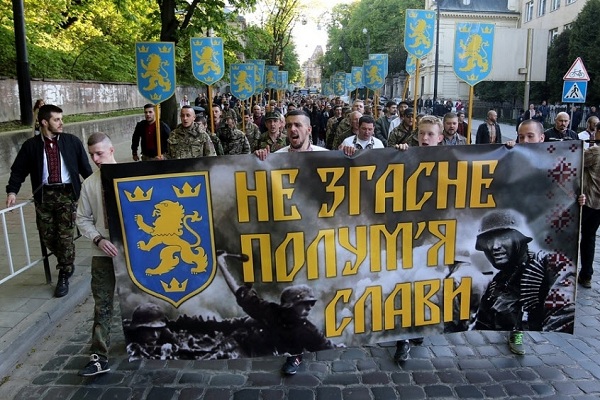
The reverse side of that process is the willingness to give up their own victory. Take, for example, the renaming of Heroes of Stalingrad Avenue. Is there anyone who believes that this avenue was named (in 1982) in Stalin’s honor? If it was named in honor of the hundreds of thousands of soldiers (including tens of thousands of Ukrainians) who were killed in one of the most important battles of the Second World War, do they not deserve such commemoration? Or are these Ukrainians no longer our heroes? If so, we ourselves are depriving ourselves of the status of victors, echoing Putin, who declared in 2014 that Russia would have won the Second World War without Ukraine’s help.
This is truly a stupid policy. At one time I regarded these gestures as childishness, a childhood disease, and a local one, to boot. But if it is elevated to the rank of state policy, the state is responsible for the consequences of its decisions.
Even in a nightmare, it is difficult to imagine more effective assistance to Russian propaganda in the international arena. Hooray-patriots do not understand that contemporary Germans are no longer their allies, they repented long ago and have been carrying around this repentance for decades. I remember how ten years ago Angela Merkel, during a meeting with Putin, mercilessly criticized the actions of the Russian leadership; she was extremely tough and principled. But at the end of the meeting Putin adroitly complained about [former Ukrainian president] Yushchenko having bestowed the title of Hero of Ukraine on [Roman] Shukhevych, Captain of the Wehrmacht, and the Chancellor reacted immediately: We can’t approve this.
The Russian media neatly excised all the attacks on Vladimir Vladimirovich [Putin], leaving fifteen seconds devoted to Shukhevych, and Ukrainian journalists replayed all this, calling Merkel “Frau Ribbentrop” for not having defended Ukraine from Putin.
We are happy to fall for these manipulations, even though there is no greater harm to Ukraine than reports in the European media about the renaming of yet another street after a hero of the Second World War, assigning it the name of a man who had collaborated with the Nazis.
This looks especially bad against the background of the strengthening of one particular dangerous trend.
In Germany people are beginning to talk in half-whispers, saying that if not for their willing helpers in various countries of the world, the Germans would not have achieved such success in solving the “Jewish question.” Hearing this, the Poles rear up and say: We fought against you constantly, we had no collaborationist formations, etc. But the Ukrainians say, yes, we were together, we are proud of the Roland and Nachtigall battalions, the SS Galicia Division; we feel like heroes.
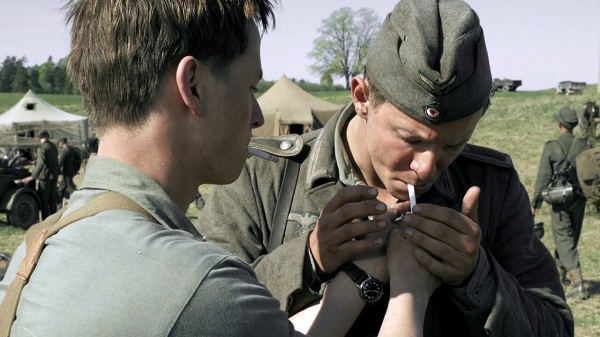
A few years ago, a TV mini-series called Generation War came out in Germany, in which one can already see the idea that without their collaborators in Eastern Europe, the Nazis would have had a difficult time. From a historical point of view, the film is made very sloppily. Poles are portrayed in a very negative light (discussion of this reached the Sejm), and Ukrainian nationalists are shown smashing Jews’ skulls. Meanwhile, these “Ukrainian executioners” are dressed in Russian shirts, and the action takes place in Smolensk. There is an established stereotype of Ukrainian nationalists as killers of Jews, but how they looked and where they lived are a bit too complicated for the average German. For some reason, this doesn’t bother us.
If the situation doesn’t change, German voices in favor of cooperation with Russia will become stronger. People in Germany are deathly afraid of dealing with countries where there is even a whiff of neo-Nazi tendencies and attempts to rehabilitate Nazis.
Is Ukraine able to overcome its history? Is it possible for books to appear in our country, like those by Jan Gross in Poland or Ruta Vanagaite in Lithuania, which set the tone for a public debate about an uncomfortable past?
At one time, I thought that Poland had dealt with its past and that the point of no return had been passed. But it turns out that with the ascent to power of conservative nationalists, everything is rolling back easily. They have a huge amount of research on uncomfortable topics — I envied the Poles, envied their discussions about Gross’s book, and it all went to waste. At sessions of the Polish Sejm today, sincere pleasure at being able to “squeeze” Gross shines through deputies’ speeches One elected official went so far as to compare Israel’s abduction of [Adolf] Eichmann from Argentina to —what Poland could do to Gross.
The story with Vanagaite is even more complicated. An immense number of Lithuanian patriots believe that everything she has written is slander. Admittedly, she truly did make a mistake in her assessment of the activities of Ramanauskas— “Vanagas,” but her opponents are grasping at straws because of her mistakes. In the end, it all comes down to the fact that Gross miscalculated, Vanagaite misrepresented, etc.
If a book like that ever comes out in Ukraine, it should be a two-volume edition, one volume of which will be devoted to western Ukraine. First of all, because the Germans’ strategy toward the local population differed from region to region. Second, where Ukrainians had at least some semblance of self-rule, one can speak of a certain Ukrainian position. Because in falsely laying blame on Ukrainian society as a whole for complicity in the Holocaust, we will hear fair objections: Did a Ukrainian state or at least autonomy exist at the time? Ukrainians in Kharkiv or Dnipro will protest, saying that we have nothing in common with the history of western Ukraine; our grandfathers fought against the Nazis…
Generalizations rarely work. This is true of all participants of historical events. But when a state announces, by means of a law, to the whole world that, for example, the OUN was a heroic organization, it thereby assumes responsibility for all its acts.
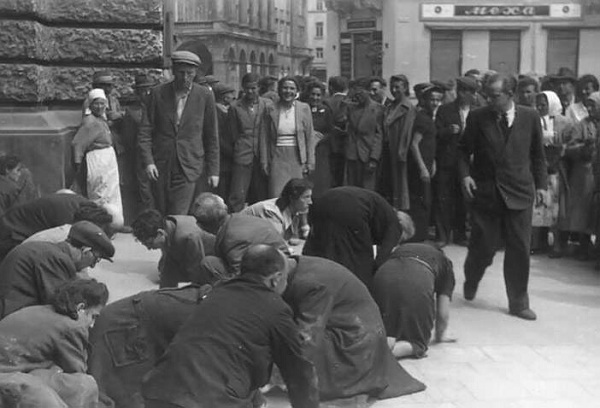
Is the public ready to hear the ugly truth?
No, not so far, largely because of the same regional differences, but not only. Galicians consider themselves nationally conscious compared to Ukrainians in the southeast, who were damaged by the Soviet government. But they, apparently, were not damaged, although many grandparents were loyal communists. Even the grandfather of the odious Svoboda party member Yuriy Mykhalchyshyn was Secretary of Agriculture of the Lviv oblast party committee.
It is time to start talking to Ukrainians as a state-building nation.
Which, probably, should formulate a general historical narrative. Is this realistic?
Recently, I went on a tour of Jewish commemorative sites in Lviv. With what do tourists associate the Opera Theater? The answer is obvious: It is an architectural landmark, a tourist attraction. And here tourists are shown a photograph that was taken on this spot in 1941, showing Jews on their knees cleaning the sidewalk practically with their bare hands, to the amusement of the local residents. One woman in the crowd is beaming with pleasure; on another person’s face, you can see gratification. Soon their Jewish countrymen might be killed. And this is also part of our narrative, one of its aspects…
As long as people do not realize this, society will operate with propagandistic clichés, rather than with real historical knowledge. That is why the formation of public history is so important. Historians—not ideologists and propagandists, but historians—should become agents of civil society, acting as intermediaries between academic scholarship and the population. Then there’s a chance that we’ll hear and understand each other.
Interview by Mikhail Gold
Originally appeared in Russian @ Хадашот.
Translated from the Russian by Marta D. Olynyk.
Edited by Peter Bejger.
NOTE: UJE does not necessarily endorse opinions expressed in articles and other materials published on its website and social media pages. Such materials are posted to promote discussion related to Ukrainian-Jewish interactions and relations. The website and social media pages will be places of information that reflect varied viewpoints.







